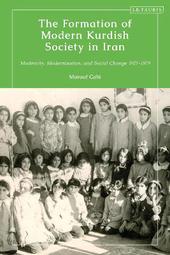
|
The Formation of Modern Kurdish Society in Iran: Modernity, Modernization and Social Change 1921-1979
Hardback
Main Details
| Title |
The Formation of Modern Kurdish Society in Iran: Modernity, Modernization and Social Change 1921-1979
|
| Authors and Contributors |
By (author) Marouf Cabi
|
| Series | Kurdish Studies |
|---|
| Physical Properties |
| Format:Hardback | | Pages:232 | | Dimensions(mm): Height 234,Width 156 |
|
| ISBN/Barcode |
9780755642243
|
| Classifications | Dewey:955.00491597 |
|---|
| Audience | | Professional & Vocational | |
|---|
|
Publishing Details |
| Publisher |
Bloomsbury Publishing PLC
|
| Imprint |
I.B. Tauris
|
| Publication Date |
16 December 2021 |
| Publication Country |
United Kingdom
|
Description
Although the Kurds have attracted widespread international attention, Iranian Kurdistan has been largely overlooked. This book examines the consequences of modernity and modernisation for Iran's Kurdish society in the 20th century. Marouf Cabi argues that while state-led modernisation integrated the Kurds in modern Iran, the homogenisation of identity and culture also resulted in their vigorous pursuit of their political and cultural rights. Focusing on the dual process of state-led modernisation and homogenisation of identity and culture, Cabi examines the consequences of modernity and modernisation for the socioeconomic, cultural, and political structures as well as for gender relations. It is the consequences of this dynamic dual process that explains the modern structures of Iran's Kurdish society, on the one hand, and its intimate relationship with Iran as a historical, geographical, and political entity, on the other. Using Persian, Kurdish and English sources, the book explores the transformation of Kurdish society between the Second World War and the 1979 Iranian Revolution, with a special focus on the era of the 'White Revolution' during the 1960s and 1970s.
Author Biography
Marouf Cabi received his PhD in History from the University of St Andrews, UK. He has published in academic journals including articles for Middle East Studies and Contemporary Review of the Middle East.
ReviewsThis book is a major contribution to the study of modernity and modernisation in twentieth- century Iran from the peripheral angel. While most of the previous studies of the modernisation in Iran have been chiefly crafted from the central perspective, the present study by opting the Kurdish-Iranian society, deals with the economic and cultural developments within a historical context of the dual process of the centre and periphery in the multicultural nation state of Iran. -- Prof. Touraj Atabaki, Senior Research Fellow at the International Institute of Social History, Amsterdam, the Netherlands
|